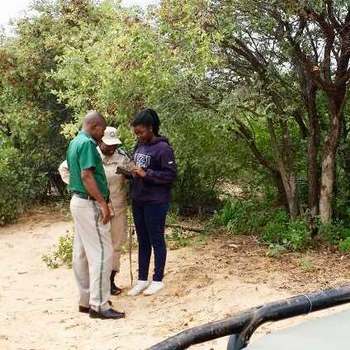|
Earth Zoo has partnered with CCB since September 2017 with the proceeds from the sale of their cool cheetah shirts going back to our field projects to help support cheetah conservation. This partnership goes a long way in promoting our cause as well as raising awareness on the plight of the cheetah. Cheetahs’ numbers are crumbling at an alarming rate and there is a need to make people aware of the situation and how they can help. Earth Zoo is an organisation with a mandate of developing new and unique clothing products, engaging people in the need to protect wildlife as well as making periodic donations to institutions responsible for wildlife conservation. So buy your shirt at Earth Zoo and make a significant contribution to cheetah conservation. Your purchase makes a huge difference and helps conserve the species.
0 Comments
CCB and the Department of Wildlife and National Parks (DWNP)’s Ghanzi office continue to benefit from working together for conservation. CCB’s research team embarked on a camera trap setup on a commercial farm in the western Ghanzi farmlands to find a solution for some highly damaging and persistent wild dog problems and had been tormenting farmers there for almost 18 months. CCB’s team headed out to the farm with three DWNP officers in order to set an array of motion-activated cameras. CCB has been undertaking a range of wildlife surveys using motion-activated cameras, known as “camera traps”. Camera traps are a great tool for obtaining information on wildlife outside of protected areas and can collect data 24 hours a day, allowing for observations of both diurnal and nocturnal species. Furthermore, they can be particularly useful for detecting rare and elusive species or animals, like African wild dogs. Our reasons for setting the cameras up were three-fold: Firstly, to see how many different wild dogs were on the farm by using their unique coat patterns to individually recognize them. Secondly, to find out if there were any patterns to their movements or behaviours, which would help us in planning mitigation measures. Thirdly, we were hoping that perhaps the extra human activity of having our research team and the DWNP officers on the farm might just be enough to scare the dogs away. After five weeks of taking photos 24/7 we had no photos of wild dogs, and the farm manager confirmed that the wild dogs seemed to disappear off the farm about the same time that we went to set the cameras. Coincidence? Perhaps. We were glad that we could give the farm managers, owners and staff some insight into the wildlife on their farm and hope that they can continue to use non-lethal measures to manage their conflicts with carnivores.
Coexistence with wildlife is a vital strategy needed in our farming areas, and CCB strives to find a variety of ways to help farmers achieve this. By understanding the ways in which wild animals are behaving and moving, we can unlock the potential solutions for human-wildlife conflict challenges. |
SearchArchives
May 2024
Categories |



 RSS Feed
RSS Feed
